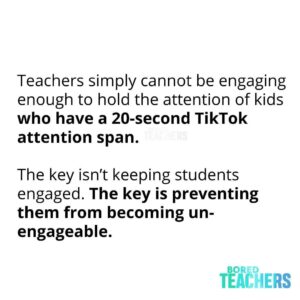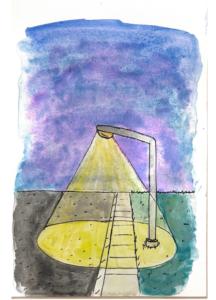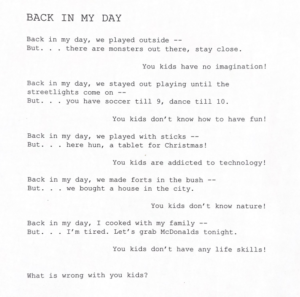What is wrong with you kids?

Source: Bored Teachers Facebook Page https://www.facebook.com/photo?fbid=943093037854033&set=a.603564571806883
I saw this post on my facebook feed today, and I thought it was fitting for this week’s discussion on digital citizenship. The comment section is wildly entertaining and chock full of deficit views on the upcoming generation if that’s your cup of tea.
Deficit views of children is a plague in education and broader society. There is a disconnect between the upcoming digital residents and digital visitors. We know the online world differently, and as adults, we idealize our childhood experiences as they are safe and familiar to us.
We discuss the impact of racism, heterosexism or eurocentrism in education quite fluently. We know that “other” ways of knowing in general are often met with fear and disapproval. However, I feel that we do not explore the effects of inter-generational discrimination on the education system enough — particularly with regard to children’s technology intertwined realities.
In one of my classes this summer, I wrote the following poem as part of a collection for an Un-Essay project which was quite fun. It paints a picture of the world we create for our youth and then the blame we cast for their participation in this world.


Many notable speakers and researchers speak to the disconnection in our communities. The work of Brendtro et. al (2019) and Dr. Jody Carrington (2019) have been influential in my understanding of this issue. Mike Ribble and Dean Shareski added a new twist to my understanding, speaking in our last class about how society has changed more rapidly since the invention of the cell phone than ever before in history.
As educators going forward with these understandings of how youth has changed/is changing, will we meet them with distain or will we change our approach to be more effective in our efforts to engage them. Scary topics of changed psychology need to be at the forefront of our mind as we work with youth on engaging safely and responsibly in their new worlds — one that we need to also be accountable for shaping.
Digital citizenship instruction is the answer to me, and as the readings pointed out this week, instruction does not need to be extensive. Even if we are not familiar ourselves, just an hour of teaching about this issue can make a difference (Ozturk, 2021, p. 37). However, if we really want to be effective, the sky is the limit. With a critical eye on instructional design, there are research proven effective strategies for today’s youth at our fingertips such as Digital Game Based Learning (Zheng & Zhong, 2022, p.2).
Mike Ribble outlines 9 Elements of Digital Citizenship in a Progression Chart as a potential framework for instruction. This all sounds fantastic, but our own barriers of villainizing technology and deficit views of youth will hold us back. In addition, an overwhelmed system with increasing accountability measures will have fewer teachers willing to add something to their plate without the time and guidance required to do so.
What we need now is systemic value placed on Digital Citizenship. A deep dive into the Saskatchewan Curriculum to explore outcomes supporting Digital Citizenship is still on my to do list. What I can say for sure is that in my past 10 years as a teacher, reading, writing and math still take the cake for being valued in education as areas of growth.
Does your school division/province value Digital Citizenship? Do you have professional development opportunities available? Is Digital Citizenship an item on your school’s learning improvement plan, or something assessed on student report cards? In your experience, are teachers excited to work with the upcoming generation and their new skills, or do you also hear deficit narratives in your setting?
At a K-5 school I feel that it is often used as an excuse that our kids are “too young” so we shy away from technology. There is also the narrative that kids don’t need anymore screentime. For some of our teachers, technology is not something they are confident working with either.
Miranda, what an awesome post. The one thing I want to comment on is digital citizenship at the divisional level. Our division values tech for kids, but doesn’t provide them with the resources or instruction needed to navigate this ever-changing world safely. I am constantly hearing deficit narratives around technology, and with this new cell phone ban, I fear that we are teaching students tech is bad (without teaching them the right ways to use it).
Do you think there should be mandated instruction in schools for digital citizenship? I’d love to know your thoughts.
Hey Taylor, thank you for your kind words!
I know a lot of teachers are already doing this, so a cautious yes. However, if it is mandated, it can not be an add on or else it will not be approached with authenticity by teachers, nor respected as a good use of instructional time. IF it were rolled out thoughtfully where staff time was respected (Paid PD Days), and funded appropriately (like reading interventions are), and assessed on a report card to validate the content to stakeholders, and monitored in strategic planning, then full steam ahead !
In 2015, the Saskatchewan Ministry of Education released a Policy Planning Guide on Digital Citizenship which has an entire section dedicated to BYOT, but I have never seen it in our division’s strategic plan. https://publications.saskatchewan.ca/api/v1/products/74447/formats/83322/download
I have to say, I cringe when I hear people use the “kids these days” trope. Attention and addiction to devices is a problem for everyone. Our kids only get to live in the world that’s created for them? Digital Citizenship has to offer alternatives rather just promoting less use or restricted use of technology. I’m as much to blame as anyone.
Miranda, I enjoyed your post. It has many beneficial points to consider. I know that I am guilty of thinking things were easier when I was a kid. At the same time, the world is changing, and we need to evolve along with it. I am in the same division as Taylor, and yes, our division is pro-technology, but I agree with her that we are not giving educators the skills and resources to use these devices. My school is 2.5 hours away from our division office, so we are often left to fend for ourselves and figure things out regarding technology problems. This can leave both students and staff frustrated and with a feeling of defeat. I know we have some teachers who have never used the iPad the division gave us for teaching. Others use it all the time.
Andrea! Let’s make this a plan for Thursday 😊 I’m so happy to support teachers in anything to make their lives easier!
Great title for a great post! I also wanted to connect digital citizenship to our Sask curriculum…. try asking Chat GPT to help you with this as a starting point 🙂
Your poem is spot on as well… it’s hard to place blame on kids and judge where they are at, when they learn these behaviors from those around them
Jenni, I gave ChatGPT a try to pull Saskatchewan Curriculum outcomes related to digital citizenship, and it very convincingly made them up! I was almost fooled until I looked at the outcome codes that it provided for Grade 10 Social Studies. Knowing that our Social Studies Curriculum is older than the internet (it is literally scanned onto the curriculum website), I knew that it did not have the same codes as our updated curricula. After a deep dive, I found out that they were all made up!
Here is a sample:
Grade 1
• Health Education: Explore ways to stay safe, including responsible online behaviors.
Outcome Number: USC1.5
Grade 2
• Health Education: Identify strategies for protecting personal information and safety online.
Outcome Number: USC2.5
Grade 3
• Health Education: Learn about online safety and respectful online interactions, including the dangers of cyberbullying.
Outcome Number: USC3.5
They look so real! I suppose I will just have to do it the old fashioned way! Haha.